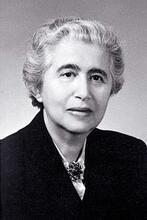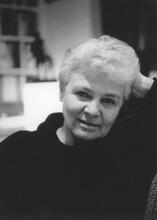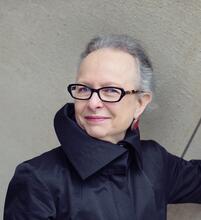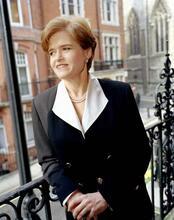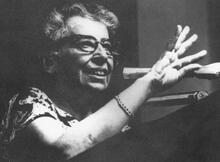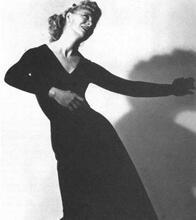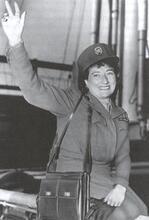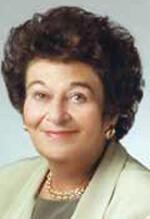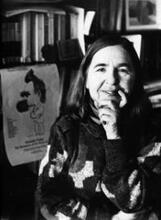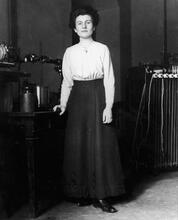Eva Gabriele Reichmann
Born in Silesia, Eva Gabriele Reichmann studied economics and obtained a doctorate in 1921. She rejected the possibility of an academic career at Heidelberg University and turned instead to communal work, serving in several labor and social unions. After fleeing Nazi Germany and settling in London, Reichmann entered the English intellectual social scene and continued her education. A prolific writer, especially after her retirement in 1959, Reichmann focused mainly on Judaism and the social history of German Jewry. Despite her own experiences under National-Socialism she was convinced that the theory of collective guilt was untenable and argued in favor of reconciliation between Jews and Germans. She was awarded several medals for her contributions to democracy, freedom, and tolerance and died at the age of 101.
Early Life and Career
Born on January 16, 1897, in Lublinitz, Upper Silesia, Eva Gabriele Reichmann grew up in Oppeln, in a home marked by Jewish religion but nevertheless assimilated, which was on friendly terms with Leo Baeck, the rabbi of the community. Her father, Adolf Jungman (1859–?), was a lawyer; her mother Agnes, née Roth, was born in 1866 and died in Theresienstadt.
From 1917 to 1921 Eva Gabriele Reichmann studied economics in Breslau, Berlin, Munich, and finally Heidelberg, where she graduated in 1921 with a doctoral thesis on “Spontaneity and Ideology as Factors in Modern Social Movements.” Rejecting the possibility of an academic career at Heidelberg University and turning instead to communal work, from 1922 to 1923 she was employed by the International Shoe and Leatherworkers’ Union in Nuremberg. From 1923 to 1924 she was active in the office of the Rawack and Grünfeld Metal Company in Berlin. From 1924 to 1938 she served as consultant to the management of the Central Union of German Citizens of Jewish Faith (Centralverein) in Berlin and at the same time collaborated in the organization’s newspaper, the CV-Zeitung. In 1933 she became editor of the organization’s cultural magazine, Der Morgen.
Career After Leaving Germany
In April 1939, together with her husband, Hans Reichmann (d. 1964), who had been briefly imprisoned in the Sachsenhausen concentration camp, she emigrated with a collective visa to England, where she enjoyed the support of the New York-based Purview Fund. The couple rapidly became acquainted with intellectuals, authors, and publishers. Their home in Hampshire became a meeting place for young historians and intellectuals, for whom Hans cooked dinners while Eva demonstrated her expertise as a connoisseur of wine. In 1942 and 1943, she worked at the BBC’s monitoring service in Evesham. Financial support from the American Jewish Committee enabled her to study at the London School of Economics, where she earned a Ph.D. with a thesis on “The Social Sources of National-Socialist Antisemitism.” From 1945 until 1959 she worked in the Wiener Library’s Research Department, first as a fellow and then as its director. At the same time, she was a board member and collaborator at the Leo Baeck Institute. After retiring in 1959 she lived in London, lecturing and engaging in freelance writing.
Literary Themes and Later Life
Eva Gabriele Reichmann’s thinking was profoundly influenced by Leo Baeck, whom she revered and to whom she referred as “the teacher of my youth.” As a result, Judaism and the social history of German Jewry are the major topics of her scholarly work and publications, as evidenced by the numerous essays and lectures she devoted to those subjects (see, in particular, her collection, “Grösse and Verhängnis deutsch-jüdischer Existenz” (The Size and Conditions of German-Jewish Existence, Heidelberg: 1974). In particular, her doctoral thesis, first published in 1949 in English in London and in 1956 in German and since then in numerous editions under the title Die Flucht in dan Hass (Flight into Hatred: The Origins of the German Jewish Catastrophe), comprises a historical, sociological and social-psychological analysis of antisemitism in Germany. The book was published in English as Hostages of Civilization: The Social Sources of National Socialist Anti-Semitism and has been described as “a classic” by the scholar of German Antisemitism Peter Pulzer.
Despite Reichmann’s own experiences under National-Socialism she was convinced that the theory of collective guilt was untenable. She argued in favor of dialogue and reconciliation between Jews and Germans, frequently traveled to Germany and gave numerous lectures (for example, on the Evangelical “Kirchentag” [Church Day], in Berlin in 1961, which she described as “the greatest of all experiences”). Because of this involvement and her contribution to democracy, freedom and tolerance, she was awarded the Bundesverdienstkreuz First Class in 1969, the Buber-Rosenzweig Medal in 1970, the Moses Mendelssohn Prize in 1982 and, in 1983, the Grosse Bundesverdienstkreuz. She was a member and co-worker in various organizations dedicated to Christian and Jewish relations and in other Jewish organizations, as well as a board member and research fellow of the Leo Baeck Institute.
Eva Reichmann died in London in September 1998, at the age of 101.
Selected Works
Hostages of Civilization. The Social Sources of National-Socialist Antisemitism. London: 1949.
Die Flucht in den Hass. Die Ursachen der deutschen Judenkatastrophe. Frankfurt am Main: 1956.
Zeitgeschichte als politische und moralische Aufgabe. Hamburg: 1962.
Grösse und Verhängnis deutsch-jüdischer Existenz. Zeugnisse einer tragischen Begegnung. Heidelberg: 1974.
“Der Bewusstseinswandel der deutschen Juden.” In Deutsches Judentum in Krieg und Revolution 1916–1923, edited by Mosse Werner and Arnold Paucker, 511–612. Tübingen: 1971.
Aronsfeld, C. C. “Eva Reichmann at 90: The Hazards of Emancipation.” In AJR Information, London (January 1987), 3.
Biographisches Handbuch der deutschsprachigen Emigration nach 1933, vol. 1 München: 1980, 592.
Guide to the Eva Reichmann Collection at the Leo Baeck Institute, New York.
Jüdische Frauen im 19. Und 20. Jahrhundret: Lexikon zu Leben und Werk. Edited by Jutta Dick and Marina Sassenberg. Rowohlt, Reinbek, 1993.
Paucker, Arnold. “Eva Gabriele Reichmann.” In Hans Erler, et.al., ‘Meinetwegen ist die Welt erschaffen.’ Das intellektuelle Vermächtnis des deutschsprachigen Judentums. 58 Portraits. Frankfurt, 1997, 279–284.
“‘Tragt ihn mit Stolz, den gelben Fleck.’ Gespräch mit Eva Reichmann.” In Aesthetic und Kommunikation. Beiträge zur politischen Erziehung. Deutsche, Linke, Juden 51 (1983): 51–70.

